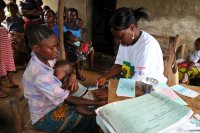News from Berlin
German Government Supports Immunization Program in East Africa
April 24th, 2014
News from Berlin - The Government of the Federal Republic of Germany has signed an intergovernmental agreement with the East African Community (EAC), committing to contribute up to 20 Million euros in an immunization program in the region.
The German Government has been working in close cooperation with the EAC Secretariat since its establishment in 2000, notably through the German Federal Ministry for Economic Cooperation (BMZ). The EAC gathers the Republics of Burundi, Kenya, Rwanda, Tanzania and Uganda, and has its headquarters in Arusha, Tanzania, where the agreement was signed.
This announcement was made a few days before the launch of the World Immunization Week organized by the World Health Organization (WHO), which takes place from April 24th to April 30th. This campaign is particularly important in developing countries, and on the African continent, where a large part of the population, including many children, do not benefit from regular and basic health services. Last year, 22 million children around the world did not have access to basic vaccination.
The theme for this year in Africa is: “Vaccination, a shared responsibility”, thereby emphasizing the fact that everybody must plays their part in tackling this issue. As Dr. Luis Sambo, WTO Regional Director for Africa, states, “The theme is a simple and clear reminder that vaccination is a joint responsibility of governments, parents, immunization programmes, health care workers, public health officials, families and communities. Everybody has a role to play.” The program, also supported by Germany, is a good step in this direction, at it brings together many state and non-state representatives from different backgrounds, governments and public institutions as well as players from the private sector and civil society.
The World Immunization Week in 2013 enjoyed huge success; several million children received doses of vaccines in 43 countries of the region, notably against polio. The WHO considers vaccinations to be among the 21st century’s most successful, most cost-effective, high-impact and most long-lasting and equitable public health tools for preventing, disease, disability and death.
By signing this agreement, Germany reiterates its commitment to build a strong cooperation with African countries in order to enhance human development on the continent.
News from Berlin – Berlin Global





